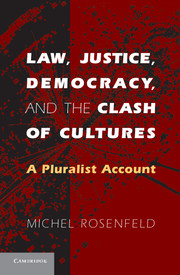Book contents
- Frontmatter
- Contents
- Introduction
- Part I Liberal Justice and Fleeting Specters of Unity
- Part II E Pluribus Unum?
- Part III Can Pluralism Thrive in Times of Stress?
- 7 Rethinking Political Rights in Times of Stress
- 8 Derrida’s Deconstructive Ethics of Difference Confronts Global Terrorism
- 9 Habermas’s Discourse Ethics of Identity and Global Terror
- 10 Conclusion
- Bibliography
- Index
9 - Habermas’s Discourse Ethics of Identity and Global Terror
Can Cosmopolitanism, Post-Nationalism, and Dialogue Downsize the Terrorist Threat?
from Part III - Can Pluralism Thrive in Times of Stress?
Published online by Cambridge University Press: 05 June 2012
- Frontmatter
- Contents
- Introduction
- Part I Liberal Justice and Fleeting Specters of Unity
- Part II E Pluribus Unum?
- Part III Can Pluralism Thrive in Times of Stress?
- 7 Rethinking Political Rights in Times of Stress
- 8 Derrida’s Deconstructive Ethics of Difference Confronts Global Terrorism
- 9 Habermas’s Discourse Ethics of Identity and Global Terror
- 10 Conclusion
- Bibliography
- Index
Summary
Terrorism’s Challenge to Habermas’s Conception of Modernism
Habermas has been a formidable and undaunted defender of modernism and of the project of the Enlightenment against all odds and all foes. And these have been numerous and powerful, such as Nazism and Stalinism in history and politics, and thinkers as diverse as Weber, Heidegger, Wittgenstein, Schmitt, Adorno, and the post-moderns, in theory (Habermas 2001: 130–56). Habermas had been in particular critical of Derrida, charging the latter’s deconstructive approach with fostering a reversion to a pre-Enlightenment mystique inimical to the project of modernity (Habermas 1990: 181–4). Habermas and Derrida met and joined hands against global terror, however, in the aftermath of the 9/11/01 attacks (Borradori 2003: xi), and on that occasion, as discussed in Chapter 8, Derrida made clear that he was on the side of the Enlightenment project – though as we shall see, his conception of it remains in sharp contrast to that of Habermas.
Habermas’s defense of modernism is predicated on a recasting of Kant’s universal moral insight and Rousseau’s republican ideal within an intersubjective communicative framework. Through communicative action guided by public reason, social actors from different backgrounds and with diverse interests can arrive at a working understanding by jointly settling on universalizable normative standards meant to regulate the realm of their intersubjective interactions. As conceived by Habermas, communicative action requires each participant in a collective discussion to have an equal opportunity to present claims for consideration and a universal commitment to be swayed only by the force of the better argument. In the context of contemporary pluralist societies, communicative action leads to a rule of law regime based on application of positive law legitimated by adherence to the “proceduralist paradigm of law.” Under this paradigm, laws are legitimate if they can be justified at once as self-imposed by those subjected to them and as satisfying universalizable normative criteria, such as those embodied in universal human rights (Habermas 1998).
- Type
- Chapter
- Information
- Law, Justice, Democracy, and the Clash of CulturesA Pluralist Account, pp. 271 - 296Publisher: Cambridge University PressPrint publication year: 2011



